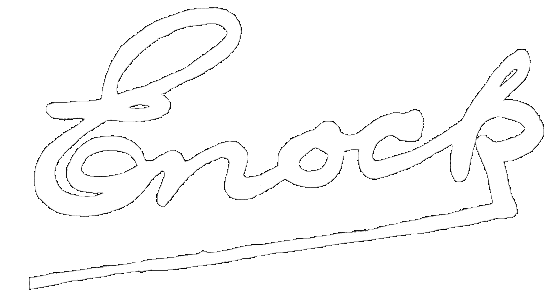

ENOCK FAMILY HISTORY
HOME | LATEST NEWS | NAME INDEX | CONTACT
Sarah Smith (nee Enock) (1810-1856).
1811-c1821 - Shrewsbury, Shropshire, England.[1]
c1821-? - New Dale, (just outside Telford), Shropshire, England.[5]
The Enocks must have moved to New Dale between 1819 and 1821. Sophia's 1819 Ackworth School admit form gives her abode as Shrewsbury, and Sarah's
is given as New Dale in 1821. There is no information to help us locate the exact residence.
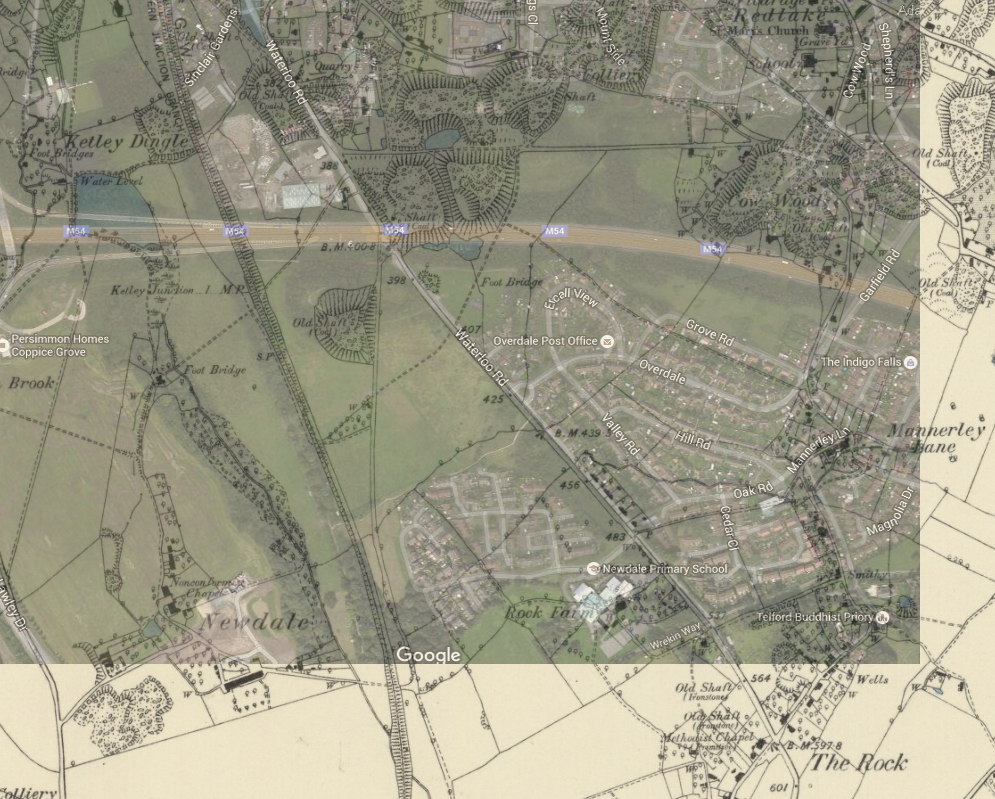
The above map shows a present map layered on top of the 1882 Shropshire OS map. The New Dale village sits just below junction 6 of the M54.[6]
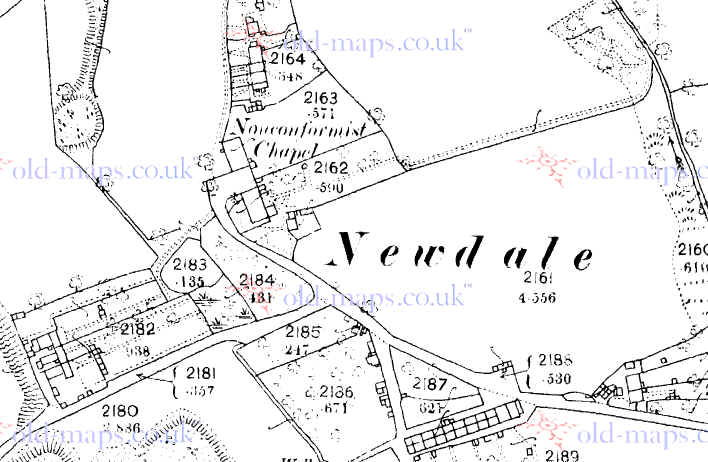
A closer look: Newdale seen on the 1882 Shropshire OS map.[7]
The area appears to have remained
unchanged right up until 1976-1977 OS map, but has completely vanished by the
time of the 1987 OS map. The area is now currently under development.
Newdale pictured on the 12th
March, 2016. Housing estate is currently under construction. The old railway
would have been on the right, and the M54 is in the distance (click to
enlarge).[8]
Newdale pictured on the 12th
March, 2016. Housing estate is currently under construction. The old railway
would have been on the right, and the M54 is in the distance, and the Wrekin
on the left (click to enlarge).[8]
1835-1837 - Birmingham, England.[4]
Slade Road seen on the 1889
Warwickshire OS map.[7]
c1843-c1846 - 59, Stock Street, Cheetham, Manchester, England.[10]
1851
- Stratford Road, Sparkbrook, Birmingham, England.[11]
1855
- 399, Bristol Road, Edgbaston, Birmingham, England.[12]
1841-c1843 - Slade Road, Erdington, Birmingham, England.[9]
The 1841 census shows that the
Enocks were living very near to Salford House on the Slade Road. The 1889
Warwickshire OS map shows that the only houses near Salford House were by
Gravelly Hill (the Spaghetti Junction end). There are a few old houses still
standing, but it is impossible to say if one of these housed the Enocks in
1841.
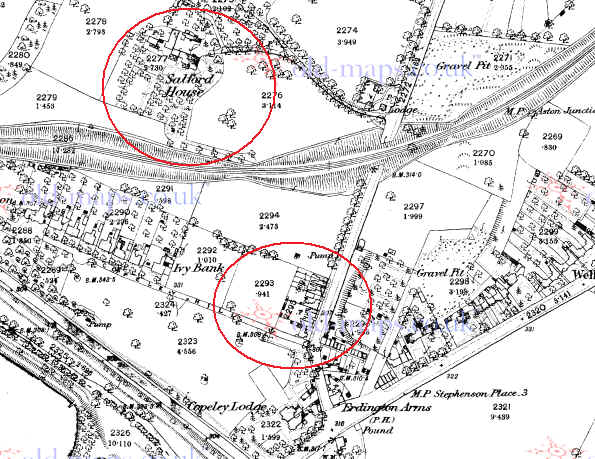
Robinson's
birth certificate states that the family were living on Stock Street in
the sub-district of Market Street. Fred's
birth entry in the Manchester, England, Non-Conformist Births and Baptisms,
1758-1912, gives the number as 59.
Most of the houses on Stocks Street appear to have been demolished in the 1950's. The area is now an industrial estate.
Rent: £15 per annum.
According to the 1851 census, the Enocks were
seven entries away from the Angel Inn Hotel. By tying this information in with
the 1889 OS town plan of Birmingham, the Enocks would have lived next-door to
Ladypool School. The house was demolished to make way for St. Agatha's Church
around 1898.
Saturday, 10th August, 1822 - Saturday, 24th December, 1825 - Ackworth School, Pontefract Road, Ackworth, Pontefract, England.[13]
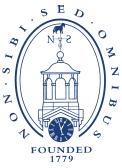
Admit number: 4544.
Agent: Bernard Dickinson.[13]
Relatives in attendance: Sarah Enock
(sister), Sarah Atkins (nee Gilkes) (second cousin), William Gilkes
(second cousin), Elizabeth Enock (nee Doeg) (future wife), Priscilla Doeg
(future sister-in-law), William Doeg (Master and future brother-in-law).[14]
Admission: 10 guineas per annum [£10.50
in today's money, measuringworth's calculator would say the relative value is
£921.30.].[15]
Life at Ackworth.[15]
Robert remained at Ackworth for the full
duration of his education, meaning he had no contact with his family for
three-years.
Robert, Sarah,
Sarah Gilkes and William Gilkes would have only seen one
another at meeting for worship or other public occasions. To spend time
together, the relatives would have congregated on a path running midway between
the two wings known as "The Flags".
It is very likely that Robert and his future
wife, Elizabeth, met here.
Scholars studied during the day, and
undertook some manual work out-of-hours.
The curriculum between 1822-1825 consisted of:
Manual work included:
An essential feature to education at Ackworth
was meeting for worship. A small part of every day was devoted to silent and
serious thoughtfulness.
Staff at Ackworth during Robert's schooling:[16]
Superintendent: Robert Whitaker.
Masters: John Donbavand (Grammar Master), Henry Brady (Reading,
Writing, Grammar & Latin Master), Thomas Brown, William Doeg (Robert's
future brother-in-law),
Housekeeper: Hannah Whitaker.
Boys' Matron: Elizabeth Preston.
Nurse: Mary Dumbledon.
Principal Tailor: Leonard West.
Principal Shoemaker: Samuel Whalley, John Wright.
Baker: Philip K. Jackson, Banjamin Walker.
Husbandman (Farmer): Robert Graham.
Principal Gardener: James Jones.
Relatives who attended Ackworth in the
past:[14]
Robert
Enock (father).
Arthur
Peters Enock (uncle).
Joseph Enock (uncle).
James Lewis Enock (cousin).
Caroline Enock (sister).
Sophia Enock (sister).
Additional
information on Ackworth School can be found here.
c1825-c1830 - Linen draper (apprenticeship).[13]
Robert left Ackworth with Henry Brady to Sheffield to Sarah Smith's care. In an 1843 survey of Ackworth old boys, it is stated that Robert apprenticed in
linen draping and then went on to become a hatter.
May 1835 - September 1837 - The Hat, Glove, Umbrella
and Parasol - 29 Bull Street, Birmingham.
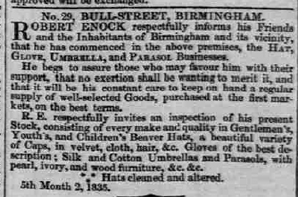
Robert's Hat, Glove, Umbrella and Parasol business - Birmingham Gazette, Monday, May 4th, 1835.[17]
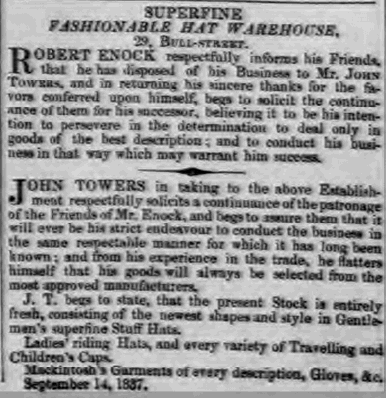
Robert's Hat, Glove, Umbrella and Parasol business - Birmingham Gazette, Monday, September 18th, 1837.[17]
In the 1843 Ackworth old boys survey, it
details that Robert had failed in business.[13]
c1837-c1855 - Commercial Traveller for
the tea trade.[11+2]
The capacities and qualities
sought in travellers remained consistent: energy, perseverance,
respectability, 'a gentlemanly style and address', and no eccentricities.
Applicants' referees were asked whether the aspirant was 'strictly honourable,
sober, and of good moral character'.
'What did travellers do?. Until
the 1870s, travellers were responsible for visiting retailers to take orders
from existing customers or called upon new customers to introduce products..
Collecting debts was an important task, especially for the small firm
struggling with liquidity. The incentive to travellers to push goods was a
guaranteed salary plus travel expenses and allowances for lodgings or hotel
accommodation, plus commission. Salaries were based on historic levels of
sales, or in new areas on partners' perceptions of what constituted a
reasonable level of sales (and level of commission attainable) in the light of
population size and the balance in the market between middle and working
classes and the poor.' - The rise
and changing role of commercial travellers in Britain between 1870 and 1914. [18]
Linen Draper.
Artisans (linen drapers fall under this category) in the provincial areas of Britain averaged earnings of 22
shillings a week [£57. 14s. per annum] in 1833. [19]
Using a calculator on www.measuringworth.com,
£57 is worth the equivalent of around £44,000 in 2014.
Commercial Traveller
I have read a number of documents published
between the mid to late 1800s that suggest that the income of a Commercial
Traveller was around the £100 mark, per annum (+ commission).
'If Frederick Manning had been able to keep
his salesman's job at Gover and Company, stationers in Holborn, at a salary of
£2 per week and 5 per cent commission….' - London 1849: A Victorian
Murder Story by Michael Alpert.
'A. was employed as a commercial traveller
at a salary of £100, a year, terminable by a week's notice.' - Reports of
cases under the bankruptcy act, 1883 [and 1890] - 1888.
"Gentleman, I hereby agree to a salary
of £100 per annum, commencing 1st December, 1861. But should I be required to
travel, that my salary will be £120, from that date" - A.F.C.
Waddell - Scottish Law Magazine, and Sheriff Court Reporter, Volume 1 - 1862.
Using a calculator on www.measuringworth.com,
£100 is worth the equivalent of around £70,000 in 2014.
We must bear in mind that between
1856 and 1857, Robert's three children, Robinson,
Fred and Emma,
were boarding at Ackworth School. The minimum charge for boarding in 1856 was
£12 per annum, meaning that Robert was
spending at least £36 [£24,000 as of 2014] per annum on education.[15]
1843 Ackworth Old Boy
Survey.[13]
In 1843, the various monthly
meetings were asked to conduct a survey of the fortunes of Ackworth old boys,
who had been at the school between 1799 and 1843. Robert's survey was as
follows:
Ackworth number: 4544.
Name: Robert Enock.
From what place sent: Newdale.
Time of leaving Ackworth: 1825.
Is he now living; if deceased,
in what year or about? Yes.
To what trade was the boy
apprenticed: Linen Draper.
What trade did the man follow
when a man: Hatter.
Has he married: Yes.
Has he entered into business on
his own account, or remained an assistant to others: On his own account.
Has he failed in business or
become dependent on his friends: Yes.
Is he now in membership with
the Society of Friends: No.
If disowned, state whether for
immoral conduct, failure in business or marriage contrary to rule: For failure.
Has he emigrated and if so, to
what country: No.
The will of Thomas Robinson (Robert's maternal grandfather) is detailed in the 'Reports of Cases Adjudged in the High Court of Chancery - Volume 3.'
The will:
'A devise of land to trustees in fee, upon trust to pay the rents to Sarah (Robert's mother), for life and after her death to apply them in the maintenance and education of all and every child and children during their minority, and when and as soon as all such children, if more than one, should have attained twenty-one, upon trust to sell, and to pay the proceeds of such sale "to and amongst all and every such child or children, share and share alike if more than one, and if but one, then the whole thereof to such only child'.
Thomas Robinson's will (click to enlarge).[21]
1. www.ancestry.co.uk England & Wales, Quaker Birth, Marriage, and Death Registers, 1578-1837 - Piece 0240: Monthly Meeting of Shropshire: Births (1757-1837).
2. Death certificate - Name: Robert Enock - Registration Year: 1855 - Registration Quarter: Jul-Aug-Sep - Registration district: Reading - Inferred County: Berkshire - Volume: 2c - Page - 202.
3. Taken from note 4, edited by Adam Enock.
4. www.ancestry.co.uk - England & Wales, Quaker Birth, Marriage, and Death Registers, 1578-1837 - Piece 0543: Monthly Meeting of Tottenham: Marriages (1736-1836).
5. Sophia and Sarah's Ackworth School admit info (see note).
6. Present map taken from Google Maps, and the 1882 Shropshire OS map sourced via: http://maps.nls.uk/geo/find/#zoom=14&lat=52.6182&lon=-1.9532&layers=6&b=1&point=0,0
7. Taken from www.old-maps.co.uk.
8. Photographs taken by Adam Enock.
9. 1841 English census.
10. Robinson and Fred's birth entries in ancestry's 'Manchester, England, Non-Conformist Births and Baptisms, 1758-1912' collection.
11. 1851 English census.
12. Address given in death notice from local paper dated 1855.
13. Information taken from documents provided by Celia Wolfe, Archivist at Ackworth School. Logo taken from Ackworth School's website.
14. List of Ackworth Scholars 1879-1930.
15. Information taken from 'Ackworth School' by Elfrida Vipoint.
16. Taken from 'Superintendents, Teachers, and Principal Officers of Ackworth School'. Can be read online here: https://archive.org/details/superintendents02hodggoog
17. Found via www.findmypast.co.uk.
18. Information sourced from here.
19. Wages in the United Kingdom in the nineteenth century - by Arthur L. Bowley - published 1900. Book can be read here. (see page 70).
20. Taken from: www.britishnewspaperarchive.co.uk.
21. Will can be can be seen here.
Updated 9th July, 2016.
 |
